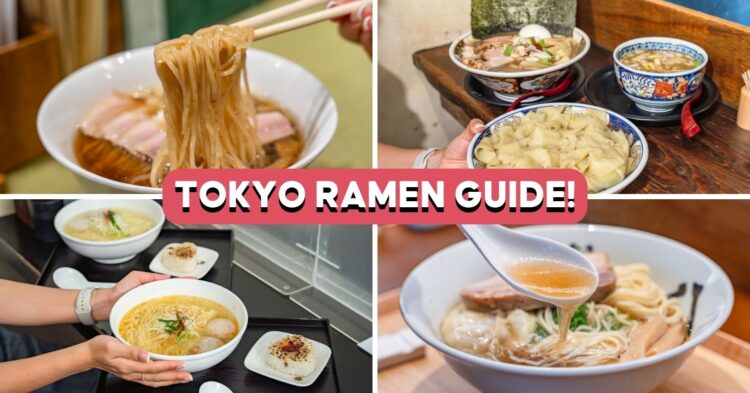Best ramen in Tokyo
If you’re headed to Tokyo anytime soon, and want to skip the usual options of IPPUDO and Ichiran—though we hear you, there’s nothing like the Ichiran experience—we’ve rounded up some of the best ramen in Tokyo that you can consider as alternatives.
1. Chuka Soba Ginza Hachigou
Don’t be fooled by the 11am opening time: you’ll have to be in line before 9am for a ticket number if you want to try the Michelin-starred ramen at Chuka Soba Ginza Hachigou, served in a consomme-like broth. Only 60 bowls are sold each day, priced from ¥1,200/~S$11. Their claim to fame is the clear, consomme-like broth, made with no sauce or salt, except from the salt-dried ham that goes into the soup, and specially selected chicken, duck, scallops, dried shiitake mushrooms, vegetables and more.
If you would rather not queue, Ginza Hachigou has introduced a new digital booking system through reservations platform TableCheck. 30 spots are released at 9am each Saturday for the following week, at half-hourly intervals daily between 12:30pm to 2:30pm.
Address: 3 Chome−14−2, Ginza, Chuo City, Tokyo 104-0061
Opening hours: Tue-Sun 11am (till sold out)
Chuka Soba Ginza Hachigou is not a halal-certified eatery
2. Kamo to Negi
It’s all fowl game at Kamo to Negi, where the soup is made with just three ingredients: duck, water, and negi, AKA spring onions. Come, even if you hate scallions. The broth is robust, yet has no gaminess, and you can have ¥320/~S$2.90 Duck Oyakodon on the side too! Prices start from just ¥980/~S$9 for ramen.
Address: 6 Chome-4-15, Ueno, Taito City, Tokyo 110-0005
Opening hours: Daily 10am to 10:30pm
Tel: +81 3-6803-2334
Website
Kamo to Negi is not a halal-certified eatery
3. Ramen Nagi
Before you skip over it, this is not the same Ramen Nagi you’ll find in Singapore. Climb up into the narrowest of ramen bars for niboshi-based ramen, made with more than 20 kinds of dried fish! Go for the dipping Tsukemen, which comes with house-made thick noodles, or the soup version, which has that plus thinner, wavy ramen. Did we mention, they’re open 24 hours, and prices start from ¥1,000,/~S$9.20.
Address: 1 Chome−1−10, 2F, Kabukicho, Shinjuku City, Tokyo 160-0021
Opening hours: Daily 24 hours
Tel: +81 3-3205-1925
Website
Ramen Nagi is not a halal-certified eatery
Tokyo Food Guide: 15 Eateries You Can’t Miss In This Bustling Japanese City
4. Yamada no Unagi
We’ve had unagi onigiri and unagi don, but unagi ramen is a first for us. Head to Yamada no Unagi, where eel bones are boiled into an ultra-creamy broth, served with both ramen and unagi rice! Heads up, they only serve these on Fridays and Saturdays, priced from ¥1,300/~S$11.90 a bowl. Save some soup from your ramen, and add it to the rice to eat it a la pao fan—trust us when we say you should definitely do it.
Check their Instagram page before you head down, because they usually put up a monthly calendar informing diners about when the ramen will be available.
Address: 4 Chome-8-14, Iidabashi, Chiyoda City, Tokyo 102-0072
Opening hours: Mon-Sat 11am to 2pm
Tel: +81 3-6261-1935
Website
Yamada no Unagi is not a halal-certified eatery
Unatoto To Open In Novena On 11 Dec, The Popular Japanese Chain’s 2nd Outlet
5. Menya Kaijin
If you’ve overindulged, give your palate a break at Menya Kaijin, a hole-in-the-wall spot right next to Shinjuku Station. Google Maps will give you the approximate location, but you’ll have to trek up several flights of narrow stairs in one of the buildings to find them. Good luck searching!
The clear broth here is made with seven kinds of fish, which change daily depending on what’s freshest! P.S: they’re Muslim-friendly too. Prices start from ¥1,000/~S$9.20 a bowl. There are spicy and non-spicy options, and you get a grilled onigiri to dunk into your soup too, adding a smoky edge to the broth.
Address: 3 Chome−35−7, 2F, Shinjuku, Shinjuku City, Tokyo 160-0022
Opening hours: Mon-Fri 11am to 3pm, 4:30pm to 10pm, Sat-Sun 11am to 10pm
Tel: +81 3-3356-5658
Website
Menya Kaijin is not halal-certified, but uses no pork or lard
6. Tsujita Tsukemen Ramen Shibuya FUKURAS
Tsujita Shibuya FUKURAS Everybody has seen Tsujihan on Instagram by now, but did you know its founder also runs a tsukemen restaurant? つじ田(Tsujita) has multiple locations in Tokyo, but they finally started opening late in the middle of Shibuya until 4AM Who does not crave for noodles after a night out? Go check out this place if you are ever in Shibuya#japan #japanese #japanesefood #ramen #tsukemen #shibuya #japantrip #japantravel
♬ Ghibli-style nostalgic waltz – MaSssuguMusic
Another late-night find is Tsujita Tsukemen Ramen Shibuya FUKURAS, which operates till 4am, six days a week! Fun fact: this ramen store was founded by the same man who gave us the viral Tsujihan sashimi bowl. Try their Rich Broth Tsukemen (¥1,050/~S$9.60), the most basic dipping ramen available here, to best enjoy the rich, pork and bonito-based broth. Included in the bowl is fresh sudachi, which cuts through the heavy flavours with a citrusy zing.
Address: 1 Chome−2−3, 1F Shibuya FUKURAS, Dogenzaka, Shibuya City, Tokyo 150-0043
Opening hours: Mon-Sat 11am to 4am, Sun 11am to 9:30pm
Tel: +81 3-6809-0019
Website
Tsujita Tsukemen Ramen Shibuya FUKURAS is not a halal-certified eatery
Tsuta Japanese Dining Has New Menu With Seafood Kaisen Don, Ebi Soba And More At Somerset
7. Madai Ramen Mengyo
Image credit: @mana.menstagram
Said to be one of the best fish ramen in Tokyo, the speciality at Madai Ramen Mengyo is their madai broth, where madai refers to red sea bream, AKA the king of fish in Japan. At Madai Ramen Mengyo, they specifically use fish from Uwajima in Ehime Prefecture and pair it with noodles made with stone-ground whole grain flour from Hokkaido. The cherry on top is sakura-smoked chashu and some yuzu zest. They were also named the champion ramen in the Tokyo Ramen Craftsman Championship!
It’s highly recommended that you order the Rice Porridge Set (¥1,230/~S$11.20), which comes with a bowl of rice that you’re supposed to add to the soup after you’re done with the noodles. If you prefer, they’ve got Madai Tsukemen (from ¥1,150/~S$10.50) too.
Address: 2 Chome−8−8, Kotobashi, Sumida City, Tokyo 130-0022
Opening hours: Daily 11am to 9pm
Tel: +81 3-6659-9619
Website
Madai Ramen Mengyo is not a halal-certified eatery
8. Fuunji
Image credit: @yellowmonkey40
It’s one of the most talked-about tsukemen around, and holds a 4.3-star rating on Google, with more than 4,000 reviews. Fuunji sees constant long queues, no matter the season, for their Tsukemen (from ¥950/~S$8.60), served with a dipping sauce that’s prepared entirely with domestically bred chickens, chicken bones, kelp, bonito flakes, and sardines from the Seto Inland Sea. This is all boiled for eight hours, strained over six hours, and then left to age overnight for the flavours to fully develop!
They’ve opened several other branches in Tokyo, but the Shibuya main store is the one to put on your list.
Address: 2 Chome−14−3, Yoyogi, Shibuya City, Tokyo 151-0053
Opening hours: Daily 11am to 3pm, 5pm to 9pm
Website
Fuunji is not a halal-certified eatery
9. Ginza Kagari
Image credit: @holidaymood.now
Michelin-recognised Ginza Kagari is famous for their tori paitan, or chicken broth ramen that’s utterly beloved for its clean, creamy flavour. Boiled purely with domestic chicken, each bowl is topped with still-pink slices of perfectly tender, boneless chicken breast. Their Chicken Paitan Ramen is priced at ¥1,600/~S$14.60, though you could also go for Niboshi Ramen (¥1,200/~S$10.90)—the addition of sardines brings extra umami flavour to the broth, which some diners prefer. Be prepared to queue; the Ginza honten, or main store, sees a permanent line outside.
Address: 6 Chome-4-12, Ginza, Chuo City, Tokyo 104-0061
Opening hours: Daily 11am to 9:30pm
Website
Ginza Kagari is not a halal-certified eatery
10. Mugi to Olive
Image credit: @yuko.s.44
Another Ginza gem to check out is Mugi to Olive, which you might spot by its wooden signboard, which reads Ginza Noodles Clam Ramen. The Michelin Bib Gourmand ramen-ya is best known for their Clam Soba (¥1,200/~S$13.70), for which they purchase hamaguri clams fresh each day from Toyosu Market. It’s a shoyu-based soup that’s supposedly made with French techniques, with the savouriness of soya sauce said to enhance the briny flavour of shellfish.
As the name of the shop suggests, you can opt to add olive oil, infused with black pepper and shallots, into your ramen: this is said to make it slightly creamier, and slightly enriches the flavour of the broth. For something stronger, try the トリプル Soba (¥1,200/~S$12.70), AKA Toreparu, or Triple Soba. This soup is a blend of chicken, clam and sardines, which accordingly produces an even richer, intensely flavoured broth.
Address: 6 Chome-12-12 Ginza, Chuo City, Tokyo 104-0061
Opening hours: Daily 11am to 3:30pm, 5:30pm to 9:30pm
Tel: +81 3-3571-2123
Website
Mugi to Olive is not a halal-certified eatery
Where to find the best ramen in Tokyo
Even if you can’t make it to Japan, your options aren’t too shabby in Singapore—check out our guide to ramen in Singapore; if you’re headed to Tokyo, we’ve got your meal planning sorted with our list of the best food to check out in Tokyo.
15 Best Ramen In Singapore, Including Famous Restaurants From Japan
Photos taken by John Lery Villanueva.
This was an independent article by Eatbook.sg
The post 10 Best Ramen In Tokyo, Including Michelin-Starred And 24/7 Shops appeared first on EatBook.sg – Local Singapore Food Guide And Review Site.






